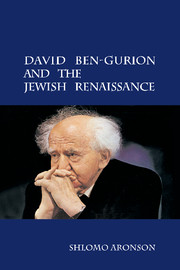Book contents
- Frontmatter
- Contents
- Preface and Acknowledgments
- Introduction
- 1 The Intellectual Origins of Ben-Gurion's Zionism
- 2 The Holocaust and Its Lessons
- 3 Ben-Gurion between Right and Left
- 4 Ben-Gurion and the Israel Defense Forces – From Formation to the Suez-Sinai Campaign of 1956
- 5 From the 1956 War to the “Lavon Affair”
- 6 From the “Lavon Affair” to the Six Day War
- Epilogue: The Renaissance That Waned and Its Leader
- Archives
- Interviews
- Abbreviations
- Notes
- Published Sources
- Name Index
- Ben-Gurion Subject Index
1 - The Intellectual Origins of Ben-Gurion's Zionism
Published online by Cambridge University Press: 01 March 2011
- Frontmatter
- Contents
- Preface and Acknowledgments
- Introduction
- 1 The Intellectual Origins of Ben-Gurion's Zionism
- 2 The Holocaust and Its Lessons
- 3 Ben-Gurion between Right and Left
- 4 Ben-Gurion and the Israel Defense Forces – From Formation to the Suez-Sinai Campaign of 1956
- 5 From the 1956 War to the “Lavon Affair”
- 6 From the “Lavon Affair” to the Six Day War
- Epilogue: The Renaissance That Waned and Its Leader
- Archives
- Interviews
- Abbreviations
- Notes
- Published Sources
- Name Index
- Ben-Gurion Subject Index
Summary
The European Renaissance and Its Interpretations
The partitioning of Italian and northwestern European history into radically different periods, as they are sometimes proclaimed to be, originates in the writings of two great nineteenth-century historians, Jules Michelet and Jacob Burckhardt. The two scholars had distinctly different backgrounds and views of history. Burckhardt was a well-rounded and occasionally somber Swiss who harbored conservative leanings. He was captivated by the Middle Ages and saw in the Renaissance much light but also the kind of shadows that a historian of his time would find due to the changes in the traditional religious social order and the release of man to follow his own talents, capabilities, loss of conscience, and vile cravings – and be subject to the authority of the cruel and powerful who would arise, as it were, from the masses of freed humanity. Michelet, by contrast, was a personable, modern, ebullient, secular Frenchman who regarded the Renaissance as an era that had broken off from the benighted Middle Ages (which he considered as having been strangled by the shackles of the church and the hairsplitting rhetoric of Scholasticism), opening the way for humankind in the modern age. Both of them saw the Renaissance not only as an era of artistic efflorescence but also as a unitary whole, during which the pinnacle of the arts, the exploration of new continents, and scientific innovations came together to create a general “discovery of the world and discovery of Man,” for better or worse.
- Type
- Chapter
- Information
- David Ben-Gurion and the Jewish Renaissance , pp. 18 - 93Publisher: Cambridge University PressPrint publication year: 2010



